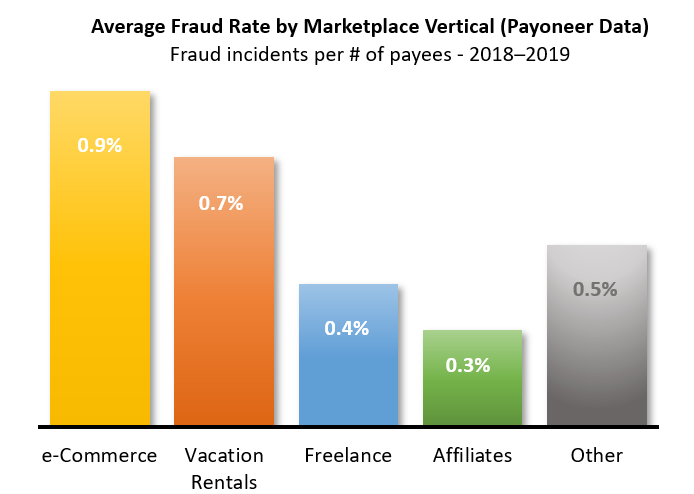
Fight Fraud, Reduce Risk, and Take Control of Your Marketplace
Seller fraud is a growing concern for our marketplace partners. This can include anything from account takeovers (ATOs), counterfeit sales and delivery fraud to lighter policy violations — but the potential end results are the same: Financial losses, bad buyer experience and compliance issues.
Our data shows that fraud is increasing across all types of marketplaces, with eCommerce taking the largest hit.


To fight seller fraud and reduce business risk, you need to know how to take measures to detect and prevent the most common types of criminal activity.
In a recent Merchant Risk Council webinar, Director of Global Risk Operations Maxim Polyachenko and I discussed the types of fraud taking place and ways that Payoneer helps marketplaces protect their funds. This post covers the highlights from our presentation along with more in-depth information pertaining to audience questions. You can also check out our compliance and risk webpage for additional information.
Common Types of Marketplace Fraud
While there are many potential areas for fraud, here are some of the key types and kinds of activity we’re seeing right now:
Account Takeover
Account takeover (ATO) is near the top of the MRC’s list of fraudulent attacks experienced by eCommerce businesses. ATO involves an attacker stealing a user’s login credentials to break into their account, where they can access private information. A potential warning flag might be a small seller with little history that suddenly has significant transaction volume, resulting in a very large payout from the marketplace. It may be legitimate, but it’s also possible that the account has been hijacked. ATO is frequently used for the purposes of credit card fraud.
Gaming the System
There are a number of ways sellers can attempt to “game the system.”
- Brushing – fake reviews, to increase or decrease store ratings
- Store burning — a mass attack on a particular store engineered by a competitor for the purposes of discrediting or disbarring said store
- Price manipulation — artificially driving up prices by appearing to increase demand or availability
Shipping Fraud
For this type of fraud, sellers will either simply not ship items that have been paid for and close their account. More complex schemes involve provide shipping information and tracking numbers that are either fake, or real tracking numbers that pertain to a different shipment.
Counterfeit Goods
Bad-actors may set up stores that advertise certain labels, but actually provide counterfeit goods. For example, the buyer thinks they are receiving a Rolex watch at an excellent price, and receive a watch that is not the real deal.
Buyer-Seller Collusion
In buyer-seller collusion, the colluding parties form the two sides of a retail transaction—merchant and customer. This may be for any purpose from increasing sales to collecting promotion money illegally to sinking competitors to money laundering. Detecting and untangling collusion is particularly challenging.
COVID-19-Related Fraud
Unfortunately, there are many “bad actors” currently taking advantage of the global pandemic. And it is too early to measure or quantify the impact of this fraudulent activity.
Both marketplaces and payment vendors are seeing a rise in certain types of fraud related to COVID-19:
- SNR/SNAD — false claims of “service not received” or items received “significantly not as described” – resulting in refunds and bringing down merchant ratings
- False advertising — attempts to sell medicines and supplements that claim to have abilities to help cure the virus
- Shipping fraud — tied to purchases of in-demand goods such as masks, gloves, and even toilet paper, where items are not shipped, and/or fake shipping information and tracking numbers are provided
Payoneer takes great care to detect and prevent such cases. However, as many shipments are being delayed due to current massive layers of complexity in cross-border trade, in some cases it is not yet clear whether fraud is being committed, and if so, by whom.
Reducing Risk and Breaking the Cycle
Most seller fraud and abuse is part of a repeating cycle, and often involves multiple marketplaces. For example, a fraudulent seller’s store may be closed on one marketplace, so they open one on another marketplace. Multiple stores may be linked together in extremely complex ways to mask their affiliation from both buyers and marketplaces.
As a global payments provider, Payoneer has unique visibility into marketplace trends and fraud patterns. This cross-border and cross-marketplace visibility allows us to break the cycles of repeating fraud, helping marketplaces avoid financial loss, bad PR, compliance and legal issues. We can also reduce overhead costs associated with seller onboarding and handling.
Payoneer can help you:
- Mitigate repeating fraud conducted with bad-actors with multiple stores — our store-linkages detection allows us to identify and mitigate this type of fraud both within a marketplace and across different marketplaces
- Identify and validate the ultimate beneficiary receiving the funds — our robust KYC policy enables us to verify identification, spot any fake documents, and uncover connections to other entities
- Gain transparency — trace every dollar in the entity’s monetary flows and flag any suspicious activity
- Prevent fraud — our cross-marketplace user behavior patterns identification helps us prevent bad actors from committing and repeating fraud across all of our customers’ domains
For more information on how Payoneer can help your marketplace, contact us at enterprisesales@payoneer.com.
Regulatory compliance is another important subject for marketplaces. On July 15, we’re presenting a webinar for European marketplaces, where we’ll address the different paths to achieving PSD2 compliance. You can register for “Evaluating Marketplace Options in the Wake of PSD2” here.
Learn more about how Payoneer can help you detect and prevent fraud




